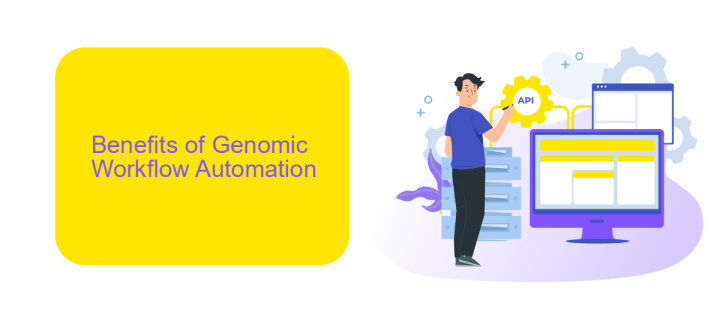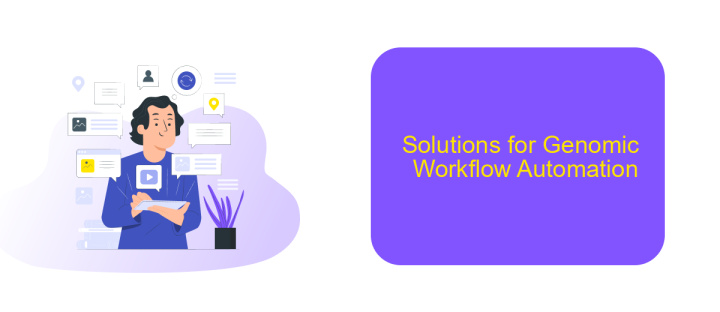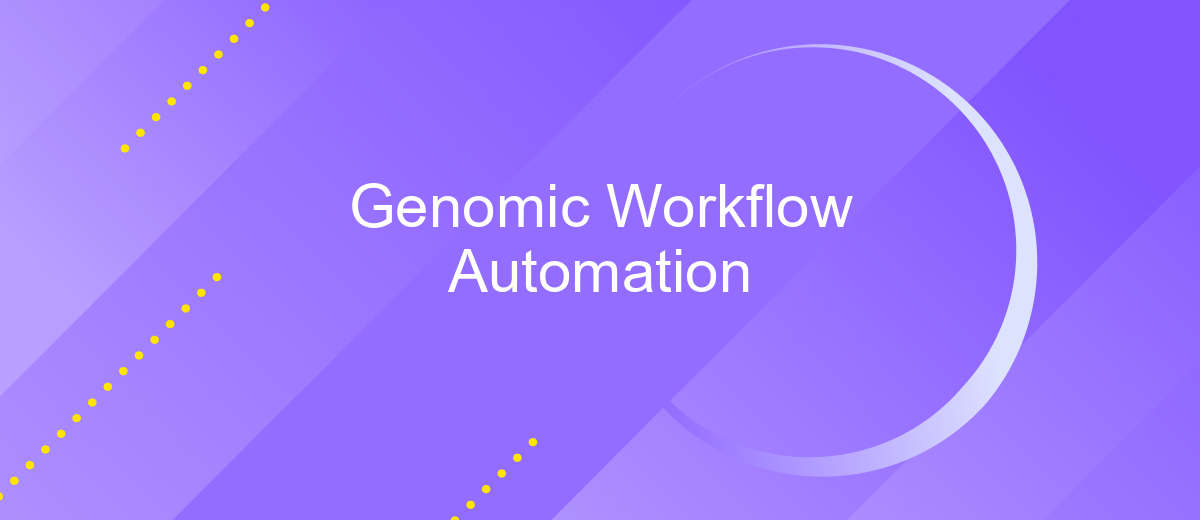Genomic Workflow Automation
In the rapidly evolving field of genomics, the automation of genomic workflows has become essential for enhancing efficiency, accuracy, and scalability. By integrating advanced technologies and software solutions, researchers can streamline complex processes, reduce human error, and accelerate discoveries. This article explores the key benefits, technologies, and future trends in genomic workflow automation, highlighting its transformative impact on modern biological research.
Introduction
Genomic workflow automation has revolutionized the field of genomics by streamlining complex processes and enhancing data accuracy. This advancement is crucial for accelerating research and improving outcomes in personalized medicine. Automated workflows reduce the manual effort required, thus minimizing errors and increasing reproducibility.
- Efficient data processing
- Improved accuracy and reproducibility
- Scalability for large datasets
- Integration with other bioinformatics tools
One of the key aspects of genomic workflow automation is the integration of various tools and services. Platforms like ApiX-Drive facilitate seamless integration between different software applications, ensuring smooth data transfer and process synchronization. By leveraging such services, researchers can focus more on analysis and interpretation rather than on managing technical workflows, leading to faster and more reliable scientific discoveries.
Benefits of Genomic Workflow Automation

Genomic workflow automation offers numerous benefits, significantly enhancing the efficiency and accuracy of genomic research. By automating repetitive and time-consuming tasks, researchers can focus more on data analysis and interpretation rather than manual labor. This leads to faster turnaround times and the ability to process larger datasets, ultimately accelerating scientific discoveries and medical advancements. Additionally, automation minimizes human error, ensuring more reliable and reproducible results, which is crucial for the integrity of genomic studies.
Another significant advantage is the seamless integration of various tools and platforms, facilitated by services like ApiX-Drive. ApiX-Drive enables easy and efficient integration of different software and databases, streamlining the workflow and ensuring that data flows smoothly between systems. This integration capability not only saves time but also enhances data consistency and accuracy, allowing researchers to leverage the full potential of their genomic data. Overall, genomic workflow automation, supported by robust integration services, is a game-changer in the field of genomics, driving innovation and improving outcomes.
Challenges in Genomic Workflow Automation

Genomic workflow automation presents a unique set of challenges that can hinder its efficiency and effectiveness. One of the primary issues is the integration of diverse data sources and tools, which often require significant customization and maintenance.
- Data Integration: Combining data from various sources can be complex and time-consuming, especially when dealing with heterogeneous data formats.
- Scalability: As the volume of genomic data grows, ensuring that automated workflows can scale efficiently is a significant challenge.
- Data Security: Safeguarding sensitive genomic information is crucial, and implementing robust security measures can be difficult.
- Interoperability: Ensuring that different tools and platforms can work together seamlessly is essential but often problematic.
- Cost: The financial investment required for developing and maintaining automated workflows can be substantial.
To address these challenges, services like ApiX-Drive can be instrumental. ApiX-Drive simplifies the integration process by providing a user-friendly interface for connecting various APIs, thereby reducing the time and effort required for data integration. This can significantly enhance the efficiency of genomic workflow automation.
Solutions for Genomic Workflow Automation

Genomic workflow automation is essential for streamlining complex processes involved in genomic research and clinical applications. By automating repetitive and time-consuming tasks, researchers can focus on more critical aspects of their work, such as data analysis and interpretation.
One effective solution for genomic workflow automation is the integration of various tools and platforms. This can be achieved through services like ApiX-Drive, which facilitate seamless data transfer and communication between different software applications. By using such integration services, researchers can ensure that their genomic data is consistently updated and accessible across multiple platforms.
- Automated data transfer between genomic databases and analysis tools
- Seamless integration of laboratory information management systems (LIMS)
- Real-time monitoring and alerts for workflow processes
- Customizable workflows to meet specific research needs
Implementing these solutions not only enhances efficiency but also reduces the likelihood of human error in genomic workflows. As a result, researchers can achieve more accurate and reliable outcomes, ultimately advancing the field of genomics.
Conclusion
In conclusion, the automation of genomic workflows has the potential to revolutionize the field of genomics by streamlining complex processes, reducing human error, and accelerating research outcomes. By integrating advanced technologies and software solutions, researchers can efficiently manage large datasets, conduct high-throughput analyses, and achieve reproducible results. This not only enhances the accuracy of genomic studies but also facilitates the discovery of novel insights and therapeutic targets.
Furthermore, the integration of services like ApiX-Drive can significantly enhance the automation process. ApiX-Drive enables seamless connectivity between various tools and platforms, allowing for the smooth transfer and synchronization of data. This capability is crucial for maintaining the integrity and consistency of genomic data across different stages of the workflow. As the field of genomics continues to evolve, embracing automation and integration solutions will be key to unlocking new potentials and advancing scientific knowledge.
- Automate the work of an online store or landing
- Empower through integration
- Don't spend money on programmers and integrators
- Save time by automating routine tasks
FAQ
What is genomic workflow automation?
How can genomic workflow automation benefit my research?
What are some common tools used for genomic workflow automation?
How do I integrate different stages of my genomic workflow?
What should I consider when choosing a genomic workflow automation tool?
Time is the most valuable resource in today's business realities. By eliminating the routine from work processes, you will get more opportunities to implement the most daring plans and ideas. Choose – you can continue to waste time, money and nerves on inefficient solutions, or you can use ApiX-Drive, automating work processes and achieving results with minimal investment of money, effort and human resources.


